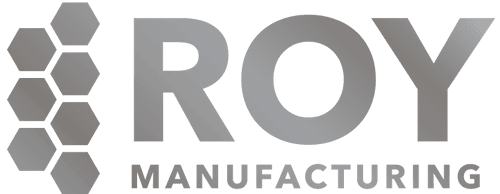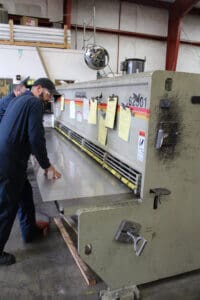Comparing Stainless Steel vs. Mild Steel
Perforated and punched metal sheets are widely used in various applications, including filtration, ventilation, and architectural accents. These sheets can be made from various materials, including stainless steel and mild steel. Using the right type of perforated metal for your project is critical. With so many options available, choosing between two metals that seem similar can make selecting the best material confusing. Here is a brief overview to compare stainless steel vs. mild steel.
Their names may sound the same, but they are very different materials.
Stainless steel and mild steel are two of the most commonly used materials for perforated and punched metal applications. While they may sound similar, they have distinct differences in terms of their composition, properties, and applications.
Composition
Stainless steel is an alloy of iron, carbon, and at least 10.5% chromium. It also contains other elements such as nickel, molybdenum, and titanium, which give it its unique properties such as corrosion resistance, strength, and durability.
On the other hand, mild steel is a type of carbon steel containing low levels of carbon (up to 0.25%) and other elements such as manganese, phosphorus, and sulfur.
Properties
Stainless steel has several properties that make it ideal for perforated and punched metal applications. It is highly resistant to corrosion, heat, and chemicals, making it suitable for use in harsh environments. It is also strong, durable, and easy to clean, making it ideal for applications that require hygiene and cleanliness.
One of the primary benefits of mild steel is how malleable this product is. Mild steel’s extremely low carbon content makes it easier to produce and shape into the desired product. It is also lighter than stainless steel. However, because it is not an alloy, mild steel is susceptible to rust and corrosion. Mild steel, on the other hand, is less resistant to corrosion and heat than stainless steel.
| Stainless Steel | Mild Steel | |
|---|---|---|
| Strength | ★ | |
| Malleability | ★ | |
| Corrosion-Resistance | ★ | |
| Weight | Heavier | Lighter |
Applications
Stainless steel is commonly used in perforated and punched metal applications that require high corrosion resistance, such as filtration, ventilation, and architectural accents. It is also used in applications that require hygiene and cleanliness, such as food processing and medical equipment. Mild steel, on the other hand, is commonly used in applications that require flexibility and malleability or lighter weight, such as for interior decor.
Both are commonly used for perforated metal solutions.
Perforated and punched metal sheets can be made from various materials, including stainless steel and mild steel. The choice of material depends on the specific application and the requirements of the final product. Here are some examples of perforated and punched metal applications:
Filtration: Perforated metal sheets are commonly used in filtration applications, such as air filters, oil filters, and water filters. Stainless steel is the preferred material for these applications due to its high corrosion resistance and durability.
Ventilation: Perforated metal sheets are also used in ventilation applications, such as air vents, louvers, and grilles. Stainless steel is commonly used for these applications due to its corrosion resistance and aesthetic appeal.
Architectural Accents: Perforated metal sheets are often used as architectural accents, such as decorative panels, screens, and facades. Stainless steel is the preferred material for these applications due to its aesthetic appeal and durability.
Structural Supports: Punched metal sheets are commonly used as structural supports, such as handrail supports and railings. Mild steel is the preferred material for these applications due to its strength and durability.
Our experts can help you evaluate stainless steel vs. mild steel for your project.
Stainless steel and mild steel are two of the most commonly used materials for perforated and punched metal applications. The good news is you don’t need to worry about trying to choose between the two.
Roy Manufacturing has been providing high-quality perforated metals and materials for over 65 years. Our experienced team members will work directly with you to review your needs and select the best materials for your project. Contact us today to learn more about our perforated metals and materials and receive a free, same-day quote for your project.

